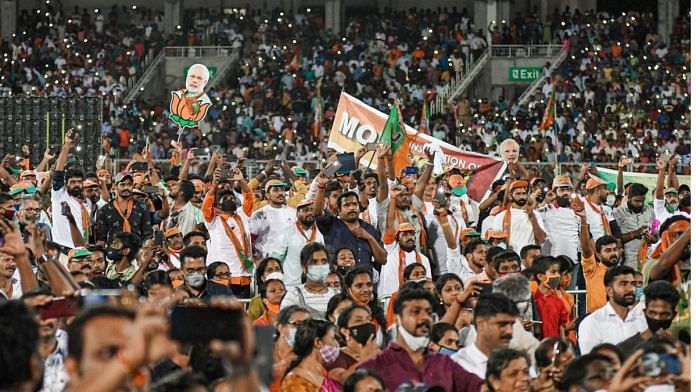Before casting their vote, do Indians consider if their financial situation has changed since the last election? Does it impact their decision to vote for or against the incumbent?
Extant research has been largely inconclusive on this aspect of voting behaviour. Some studies answer in the affirmative; others disagree. Consequently, the dominant view is that an average Indian voter is primarily swayed by ideology or identity, or a combination of both.
One reason why studies about pocketbook voting (where household economic conditions are the priority) in India have been inconclusive is perhaps related to the way individual/household financial situation is measured. Much of this research is based on the National Election Study, anchored by CSDS-Lokniti, which uses a post-poll recall measure of changes in household economic conditions in the five-year period preceding the election.
According to the comparative politics literature, this measure may be problematic on two counts. First, information-constrained voters may use changes in household economic conditions in the last year before the election as a convenient heuristic for assessing the same over the incumbent’s five-year tenure. Second, post-poll recall measures may suffer from endogeneity bias — that is, even if my household’s economic conditions deteriorated under the incumbent party, I still vote for it. And to avoid cognitive dissonance, I may misreport my household’s economic conditions.
In a recent study, co-authored by Anil Varughese, we use data from a survey conducted in Junglemahal (West Bengal) and Thiruvananthapuram (Kerala) before the 2019 Lok Sabha election. The survey asked respondents about their assessment of changes in household economic conditions in the year leading up to the election, a measure that has been validated in cross-national studies. We found systematic evidence of pocketbook voting in the two otherwise dissimilar constituencies.
What remains to be understood, however, is whether the Indian voter’s pocketbook assessment actually correlates with changes in individual and household incomes or simply captures structural characteristics of the household or assessment of changes in the country’s economic conditions. The latter is well-known to be open to manipulation by the nationally incumbent party.
Also read: One way to de-polarise Indian politics—add MOTA to the ballot
The Consumer Pyramids Households Survey
In an ongoing research project, I fill this gap by using the Consumer Pyramids Households Survey (CPHS), a continuous panel survey conducted by the Center for Monitoring Indian Economy (CMIE). My research predicts responses to a question about changes in family finances compared to a year ago, which is embedded in the Aspirational India module of the survey, using measures of change in income from various sources over the same period constructed from the Income Pyramids module.
The CPHS surveys approximately 1,70,000 households in each wave, which takes four months to complete. Sample households are visited three times (three waves) per year. The surveys have been ongoing since 2014.
For the purposes of the study, I restrict my analysis to the three waves of the survey that were conducted between May 2020 and April 2021. I predict assessments of change in family finances as reported in the January-April 2021 wave using change in income from various sources between the May-August 2020 wave and the January-April 2021 wave, controlling for income reported in the May-August 2020 wave and several covariates measured in the January-April 2021 wave, including responses to a question about changes in the conditions of the country over the next year.
I chose the May 2020-April 2021 period for validating the pocketbook assessment measure under the assumption that if respondents can accurately link their assessments of changes in their financial situation to changes in income over this period, which overlapped with the two waves of Covid-19, then they will certainly do so in more “normal” times.
Also read: Crowds at rallies don’t mean victory and have no bearing on how voters will vote
The Pocketbook Matters
My analysis shows that even though the structural conditions of households—occupation group, education group, gender group, and region type—and assessment of conditions in the country are significant predictors of assessment of changes in family finances in the January-April 2021 wave, change in income between the May-August 2020 and January-April 2021 wave also had statistically and substantively significant effects in the predicted direction. Most importantly, this effect accrued from changes in wage income, which varied the most for the vast majority of respondents.
In particular, I find that, all else equal, an increase in the cumulative wage income of all members of the household by Rs 10,000 increased the chances of respondents reporting that family finances had been better compared to a year ago by roughly 0.6 percentage-points on average. Conversely, all else equal, a Rs 10,000 increase in cumulative wage income reduced the chances of respondents reporting that family finances had become worse compared to a year ago by roughly 1.1 percentage-points on average. Respondents also had the option of reporting that family finances had remained the same.
Furthermore, these results hold even when I control for households whose wage incomes increased or declined precipitously during this period—the top 10 per cent and the bottom 10 per cent.
All in all, my findings show that the Indian voter is, at least in part, driven by pocketbook considerations even as she continues to be swayed by considerations of ideology and identity as extant research has argued.
Subhasish Ray is Professor and Associate Dean at the Jindal School of Government & Public Policy, O.P. Jindal Global University, Haryana; and an editor for the Journal of Genocide Research. He tweets @subhasish_ray75.
(Edited by Ratan Priya)



